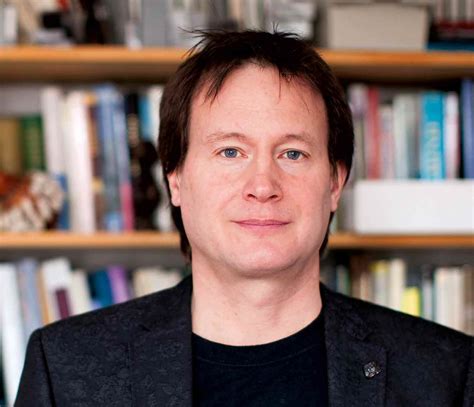A Quote by Thomas Metzinger
I believe that if we would carefully apply the distinction between transparency and opacity to the different layers of the human self-model, looking at self-consciousness in a much more careful and fine-grained manner, then we might also arrive at a new answer to your original question: What a "first-person perspective" really is.
Related Quotes
For a human being, to possess a consciously experienced first-person perspective means to have acquired a very specific functional profile and distinctive level of representational content in one's currently active phenomenal self-model: It has, episodically, become a dynamic inner model of a knowing self.
If the denial of death is self-hatred, as it is to deny our freedom and live in fear of death (which is to say, to live in a form of bondage), then the acceptance and affirmation of death is indeed a form of self-love. But I'd want to make a distinction between a form of self-love which is essential to what it means to be human, and a narcissism of self-regard, like Rousseau's distinction between amour de soi and amour propre, self-love and pride.
There has certainly been a great deal of work addressing the relationship between naturalism and the first-person perspective. Quite a number of philosophers have suggested that there are features of the first-person perspective that naturalism just cannot accommodate, whether it be qualitative character, or consciousness, or simply the ability we have to think of ourselves in a distinctively first-person manner.
In L.A., we have a saying - 'What do you do?' It's less of a question and more of a self-defense mechanism for wayward screenwriters looking to slip you a first draft, or the occasional actor looking to get in on the latest shoot. But I hate the question because of my own answer - I write about games.
People's experiences are all different, and you don't know what the person experienced. They know, but you don't, so I think it's important to listen carefully to what a person has to say. And not to force them into any direction at all but simply to model what you've experienced, model it and also be what I call a Listening Presence. If you're really listening, then some of the barriers can dissolve or change.
My picture of the world is drawn in perspective and not like a model to scale. The foreground is occupied by human beings and the stars are all as small as three-penny bits. I don't really believe in astronomy, except as a complicated description of part of the course of human and possibly animal sensation. I apply my perspective not merely to space but also to time. In time the world will cool and everything will die; but that is a long time off still and its present value at compound discount is almost nothing.
It is easy enough to say, Be true to your values. But what if your values are irrational? Or what if the virtues you have committed yourself to are so much against human nature that they cannot be practiced consistently? Be careful of what you accept as your code of morality. Think carefully about whether its tenets serve your life and well being. Exercise critical judgment. Realize how much is at stake-your life, your happiness, your self-esteem.
Our self illusion is so interwoven with personal memories that when we recall an event, we believe we are retrieving a reliable episode from our history like opening a photograph album and examining a snapshot in time. If we then discover the episode never really happened, then our whole self is called into question. But that's only because we are so committed to the illusion that our self is a reliable story in the first place.
The discoveries of the last couple decades are showing that properties of a self do actually inhere in matter, that matter seems to have properties of self-organization and life, even intelligence, consciousness. I can't say that science has proved these things, but it at least suggests the possibility. As we re-invest the world with sacredness, "spiritual" comes to mean something very different. If only a human being has these qualities, then spiritual work is inner. It's all about your own consciousness.
In literary representation, the distinction between the genuinely erotic and the licentious is a distinction not of subject-matter, but of perspective. The genuinely erotic work is one which invites the reader to re-create in imagination the first-person point of view of someone party to an erotic encounter. The pornographic work retains as a rule the third-person perspective of the voyeuristic observer.
...being human always points, and is directed, to something, or someone, other than oneself—be it meaning to fulfill or another human being to encounter. The more one forgets himself—by giving himself to a cause to serve or another person to love—the more human he is and the more he actualizes himself.... What is called self-actualization is not an attainable aim at all, for the simple reason that the more one would strive for it, the more he would miss it. In other words, self-actualization is possible only as a side-effect of self-transcendence.
In ordinary life, the phenomenology of embodied emotions is an excellent example for dynamic changes between transparency and opacity: You can "directly perceive" that your wife is cheating you, or you can become aware of the possibility that maybe it is you who has a problem, that your "immediate" emotional representation of social reality might actually be a misrepresentation.







































